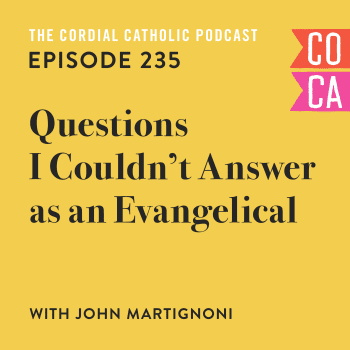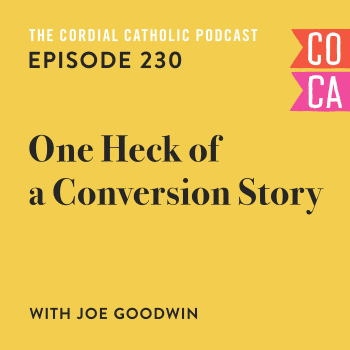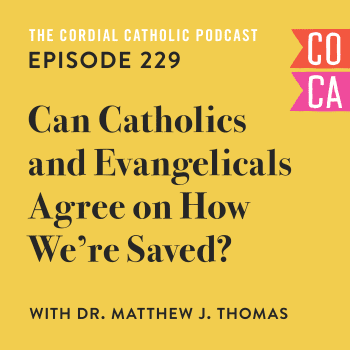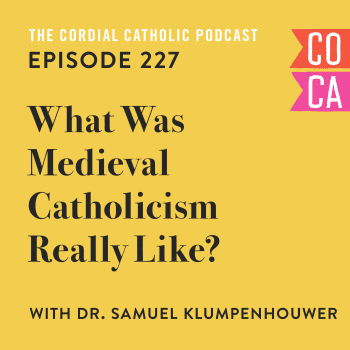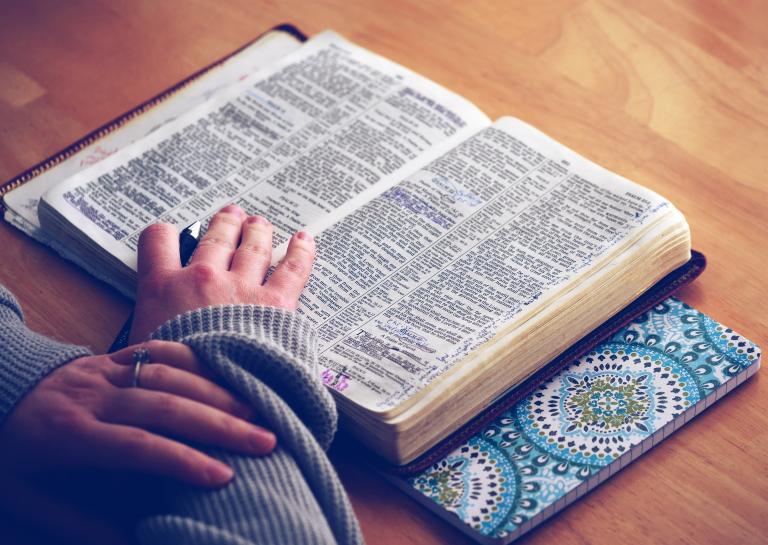
This article is part of the Tough Questions series. A series highlighting some of the difficult questions I was asking during my conversion from a non-denominational Christian to full communion with the Catholic Church. For more about my own conversion story, read What I Wish I Knew About Catholics (And Why I’m Becoming One).
As an non-denominational Christian growing up in the faith I encountered my share of tough questions. When I gave my life to Christ at the age of fifteen I quickly encountered some of them. I realized, early in my faith journey, that being a Christian wasn’t going to be as easy as opening my Bible and following the instructions even if that was often how it was presented. Because, as it turned out, Christians interpreted those so-called instructions in many, many different ways.
On relatively small topics like what sort of music is best or how to structure a Sunday worship service to massive, foundational topics of importance like how we’re saved or the nature of God Christians didn’t agree. And I wondered, if God really intended us to use the Bible to understand how to live, why can’t we agree on what it means?
Something wasn’t adding up.
What I realized, as I dug into the history of Christianity, was that not all Christians had this same problem because not all Christians used their Bibles like that. And that, historically, it wasn’t the Bible that taught Christians to live but the Church which taught Christians to understand the Bible. Otherwise, we all come up with our own interpretations.
This is true for both the majority of Christian history (for the first 1,500 years) and for the majority of Christians worldwide.
I was dumbstruck.
But, in hindsight, it makes sense. A faith which holds up the Bible as the be-all-and-end-all, the final rule and arbiter, faces three tough questions. As a serious Bible-believing Christian, as a student of Scripture, these were questions I found myself asking, and the answers were surprising.
Question 1: What About the First 300 Years?
Christians that treat the Bible as their personal rule of faith have to contend with the startling fact that for the first 300-400 years there actually wasn’t a Bible.
Instead, local churches grew up under the authority of the apostles. When the apostles died successors were appointed to lead, and plant, communities and so on and so forth. This is how Christianity spread through time and space: through a church hierarchy and authoritative framework.
Today, non-denominational Christians plant church communities with little to no consideration for the broader Christian landscape but this wasn’t the case for the first 1,500 years of Christianity. History shows us that Christians who planted their own communities outside of the strict authority of an appointed successor—a bishop—would be condemned as heretics, apart from the true faith.
So, for the first 300-400 years of Christianity, churches rose up and flourished under this strictly established framework with no clear or collected Bible to guide them.
While certain books, letters, and even collections of books were being passed throughout ancient Christendom these were only received as authoritative by communities through the acknowledgement of the appointed bishops. In other words, Paul’s first letter to the Corinthians didn’t spread and become popular because everyone was reading it—everyone was reading it because the authoritative church, the apostles and their successors, affirmed it as being written by Paul and worthy to read.
It wasn’t until 300-400 years after the death of Christ that a biblical canon was actually reasonably established—and it was the church which began at the apostles and followed a hierarchy down through time, not a group of disparate Christian communities, that met and authoritatively affirmed which books and letters belonged.
That Church was called the Catholic Church and its hierarchy extends until today, unchanged.
The tough question for Bible alone Christians, and the question I had to ask myself as one of them, was if the Bible was the sole rule of faith, what happened for the first 300-400 years? How did those Christians know how to live? And how did they know which letters and books to trust? How did they eventually know that books to include in the Bible?
Question 2: What About People Who Couldn’t Read?
It’s a fact of history that Martin Luther and the invention of the printing press ushered in a new era of Christianity. The popular myth is that the Reformation struck back at a corrupt and chaotic Catholic Church which had perverted and prevented the true Christian faith. Luther and the early reformers held up the Bible as the golden standard for Christianity and declared that the Catholic Church had simply, and intentionally, been misinterpreting it.
Incredibly, Luther and the reformers contended that for nearly 1,500 years the Catholic Church had got it wrong.
But if Christians were to understand their faith by reading the Bible and not by following the corrupt Catholic Church—and if Luther’s re-reading of the Bible and his new found interpretation were right—what about those that couldn’t read?
As a non-denominational Christian I struggled to understand how this made any sense. Unless a Christian is able to read the Bible for themselves then they’re subjected to someone else’s interpretation either way. They’re forced to trust someone else’s reading of it—and rely on someone else to read it to them in the first place.
And what about the 1,500 years before the printing press?
For me, this was a tough question. Because, really, if the thing that tells me how to live the Christian life needs to be read then that’s a system which excludes the majority of humankind throughout the majority of human history.
Question 3: What About All the Different Interpretations?
It’s no secret that the landscape of North American Christianity these days is fairly diverse. Our understanding of how to interpret the Bible, from the very small things to the incredibly huge, runs the gamut. How two honestly God-fearing, Bible-believing churches can read the same passage of Scripture and discern two completely divergent interpretations caused me, as a non-denominational Christian, to scratch my head.
Did this system make any sense?
This was a tough question: If we’re meant to use the Bible to understand how to live then how come we all understand it so differently?
The standard answer, as I dug for some kind of solution, was that differences on the small things didn’t matter. It wasn’t a big deal if we couldn’t agree on what kind of music was appropriate for a worship service, if women should still cover their heads in church, or if it was OK to drink alcohol (and, then, how much was OK?). But the landscape of Christian denominations wasn’t created based solely on the small things because Christians can’t agree on the big things either.
Massive faith issues like what it means to be saved, how is marriage defined, and what is the nature of God—these are open to interpretation as we all try to understand Bible for ourselves.
Could this really be the way God intended?
Tough Questions with a Succinct Answer
In the end, as I asked these tough questions on my own faith journey I was slowly but surely lead towards the Roman Catholic Church. It was the last place I ever thought I’d go. To a non-denominational Christian living in the twenty-first century the Catholic Church didn’t even seem relevant to me. Did people even become Catholic anymore?
But it was the Catholic Church, of all things, which offered succinct answers to these tough questions.
It was the Church, in a historically traceable lineage back to the Christ-appointed apostles, which claimed not only to have collected the books of the Bible and to have authoritatively canonized them, but also to have the ability to interpret them too. It was the Church, which Paul calls, the “pillar and bulwark of truth” (1 Timothy 3:15) that exists to help us understand how to live.
And, suddenly, it all made sense.
God didn’t leave us a book to read and understand for ourselves, he left us his Church which, as it turns out, created a book. But it was the Church he left. A Church with the power to bind and loose, to teach and to guide, and to answer the tough questions as they came up.



